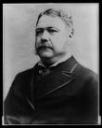Chester Alan Arthur 1829 - 1886
September 12, 2007
 Chester Alan
Arthur 1829 - 1886 was
the 21st President of America for only two years.
Chester Alan
Arthur 1829 - 1886 was
the 21st President of America for only two years.
He was supported by homeopathic supporter Ulysses Grant and opposed by homeopathic supporter Rutherford Hayes, and he lost the patronage of homeopathic supporter James Garfield. He was separated from his wife just before he became elected President, probably due to his high living, and he was then suddenly widowed and devastated when she died.
Arthur earned the support of homeopathic supporter, author Mark Twain, deeply cynical about politicians, conceded, “It would be hard indeed to better President Arthur’s administration.”
“The introduction of Homeopathy forced the old school doctor to stir around and learn something of a rational nature about his business. You may honestly feel grateful that Homeopathy survived the attempts of the orthodox physicians to destroy it.” Mark Twain
Arthur’s Secretary of War was Robert Todd Lincoln, son of homeopathic supporter Abraham Lincoln.
Arthur visited Long Beach and he is listed as a famous patron of homeopathy and he supported their ideals:
Arthur became principal of North Pownal Academy in North Pownal, Vermont in 1851. He studied law and was admitted to the bar in 1854. Arthur commenced practice in New York City, where he supported equal rights for blacks who objected to the racial segregation of city transportation. He also took an active part in the reorganization of the state militia.
Arthur was Vice President to homeopathic supporter James A Garfield but their friendship did not survive the politics of the day. James A Garfield’s cousin, homeopath Silas Boynton wrote to Arthur regarding Hinsdale’s appointment as minister to the Sandwich Islands in 1881 to solicit political influence, but Arthur was able to go his own way.
When Arthur became President he rose above the political factions because he knew he was dying:
President Arthur demonstrated that he was above not only factions within the Republican Party, but possibly the party itself. Perhaps, in part, he felt able to do this because of the well-kept secret he had known since a year after he succeeded to the Presidency, that he was suffering from Bright’s Disease, a fatal kidney disease.